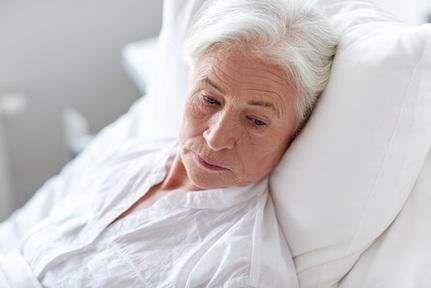NHS hospitals refused to admit care home residents and 'ordered not to resuscitate' during pandemic
Some NHS hospitals operated a ‘no admissions’ policy for care home residents at the height of the pandemic and told care homes to put a blanket ‘do not resuscitate’ order on their residents, according to care home nurses.

A new report by the Queen’s Nursing Institute (QNI) into the experiences of care home nurses during the coronavirus pandemic revealed 10 per cent said they had been told to place blanket ‘do not resuscitate’ orders on their residents or found the decision on resuscitation was taken by GPs or hospital staff without discussion with residents, families or care home staff.
A fifth said that during March and April, they had admitted residents from hospitals who had tested positive for COVID-19 in hospital. Forty-three per cent said they had admitted residents from hospital with an unknown COVID-19 status during March and April 2020.
Dr Crystal Oldman, the QNI’s chief executive said: “Overall, as would be expected, the picture presented is of an extremely stressful and anxious period for professionals working to care for and protect their residents.
“The care being delivered in a home can at times be as intensive as in a hospital – in particular for end of life care – and it is hugely skilled work. As the majority of respondents to this survey indicate, the people living in their care homes need a combination of support for complex physical and cognitive needs.”
However she added: “More needs to be done to understand the effect of COVID-19 on the workforce and residents in care homes. Urgent attention must be paid to the sector if the workforce is to withstand the additional demands of the pandemic, particularly in planning, guidance and employment practices.”
Findings are 'very concerning'
Deborah Alsina, chief executive of older people’s charity Independent Age, called the findings, particularly those relating to do not resuscitate orders “very concerning”.
She said: “The pandemic has been an extremely challenging time for both patients and health and care professionals, but older people should not have their choice and control removed regarding how their life ends, simply because of their chronological age.
“Do not resuscitate orders should, wherever possible, be made in consultation with the person concerned and their family and be based on fitness to be treated, as well as personal preference. Care home staff have been under enormous pressure over the last five months and it is unfair on both staff and residents, to be instructed to change DNR plans without consultation.
“It’s critical that the decision-making process that allowed this to take place is properly investigated so that the same mistakes are not made again.”
Care home residents 'deserve a public inquiry'
Her stance is echoed by Mark Topps, care home manager for Little Wakering House in Southend-on-Sea, which cares for people with learning disabilities and autism.
He said: “The decision made by the NHS just shows how people living with a learning disability are still viewed within society and not considered equal to everyone else.
“I am not sure how the person and their next of kin have not been consulted and I think that they now deserve a public inquiry into how and why this decision was made.”
The research reveals that care home nurses also reported problems accessing hospital care for their residents with a quarter saying it had been ‘somewhat difficult’ or ‘very difficult’ during March to May 2020.
An additional finding in the report was that 12 per cent had found it difficult or very difficult to get hold of end of life medication or services for their residents.
Two thirds of care home nurses said they always had appropriate PPE. A fifth reported positive or mixed sentiments, such as pride in their colleagues, from working during the pandemic while 80 per cent reported very negative experiences. Fifty-six per cent said they felt worse or much worse in terms of their mental and physical wellbeing.
'We need to support the care home workforce to face the challenges ahead'
Alison Leary, director of the ICNO and Professor of Healthcare and Workforce Modelling at London South Bank University said: “It is clear from this survey that the care home workforce has faced very challenging issues. Many have felt unsupported and their wellbeing has suffered. We need to support this workforce to face the challenges ahead.”
The Queen’s Nursing Institute (QNI) is the world’s oldest nursing charity, having been founded in 1887 to organise the training and supply of district nurses. Today it offers a wide range of support to all nurses working in community settings in England, Wales and Northern Ireland.
To read the full report click here
Latest News
 29-Jul-24
Dementia Bus gives carehome.co.uk staff insight into life with dementia
29-Jul-24
Dementia Bus gives carehome.co.uk staff insight into life with dementia
 01-Mar-24
Find out the top care homes in 2024
01-Mar-24
Find out the top care homes in 2024
 21-Mar-23
UK's top care homes in 2023 revealed
21-Mar-23
UK's top care homes in 2023 revealed
 03-Jan-23
carehome.co.uk launches free care helpline
03-Jan-23
carehome.co.uk launches free care helpline
 13-Dec-22
5 mins with Emily Whitehurst, chief operating officer for Constantia Healthcare
13-Dec-22
5 mins with Emily Whitehurst, chief operating officer for Constantia Healthcare